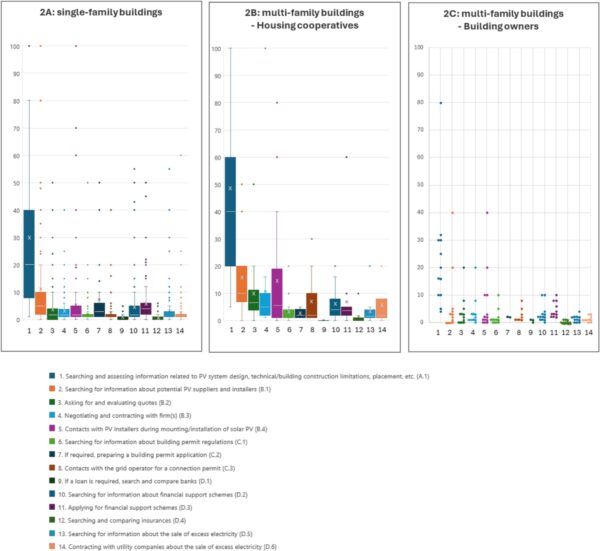Researchers from Sweden’s Lund University have assessed the transaction costs of residential solar photovoltaic acquisition. Their focus was on time as a transaction cost, thus essentially constituting the time spent on searching for and assessing information, as well as the time spent on aspects related to financing, permits, and contracts. “Understanding transaction costs to PV deployment and concretizing them is critical for providing policy support to reduce these costs to accelerate an energy transition,” authors Dr. Sofie Sandin Lompar and Lena Neij told pv magazine.
“The objective of this study is thus to empirically assess the transaction costs that solar PV adopters carry when proceeding with an acquisition process,” explained the academics. “Data on transaction costs, expressed as time spent on 14 sub-tasks, for residential building-mounted PV systems in southern Sweden (acquired 2015–2021) were collected through online surveys targeting owners of single-family and multi-family buildings.”
The survey was sent to 1,281 participants and had 300 valid responders. 264 of them were single-family (SF) building owners and the rest were multi-family (MF) building owners. Out of 36 MF responders, 14 were building companies and the other 22 were housing cooperatives. A focus group was arranged to triangulate the survey results for the MF responders.
“There were 116 questions in the survey overall,” said the team. “Respondents were asked to estimate the total number of hours spent on tasks related to the PV acquisition process. In addition, respondents were given the option to complete multiple-choice questions and provide a rating on a scale of 1–5 regarding the perceived quality and availability of information, where 1 indicated poor and 5 excellent. Respondents could also provide free-text responses to provide complementary answers and reflections.”
In terms of installed PV capacities, the reported effects typically range from 3 kW to 25 kW for the SF group and 8 kW to 484 kW for the MF group. The average time spent on the whole process was 83 hours for SF building owners, 70 hours for MF building owners, and 138 hours for MF housing cooperatives. Median time was 45 hours, 36 hours, and 86 hours, respectively.

Source: Lund University, Energy Research & Social Science, CC BY 4.0
All groups have said that the initial preparation phase of scoping information was the most time-consuming task – representing 37% of the average time spent by SF, 31% in the case of MF companies, and 36% in the case of corporations. The selection of suppliers and installers is the second most time-consuming task for the SF building owners and the MF housing cooperatives, with 13% and 12% of the average time, respectively. In the case of MF companies, it was 10%.
“In August 2018, building permits were typically no longer required for installing solar PV systems on buildings throughout Sweden,” the group highlighted. “This alleviations in the national building code reduced the share of permits required for the SF respondents from 26% (2015–2018) to 9% (2019–2020), and for MF respondents from 71% (2015–2018) to 32% (2019–2021).”
In both the SF and aggregated MF groups, approximately 57% of the respondents said that they handled the communication with the grid operator by themselves, and more than 80% of those spent 0–2 h on the application.
“Out of those who needed to get a loan to fund their PV purchase, 86% of the SF and 100% of the aggregated MF groups reported spending 0–1 h on this task,” the academics showed. “The survey responses also indicate minor concerns regarding issues related to insurances, as 63% of the respondents from the SF group and 61% from the aggregated MF group state that they spent no time at all on this.”
Their findings were presented in “Assessing the transaction costs of residential solar photovoltaic acquisition,” published in Energy Research & Social Science.
This content is protected by copyright and may not be reused. If you want to cooperate with us and would like to reuse some of our content, please contact: editors@pv-magazine.com.



By submitting this form you agree to pv magazine using your data for the purposes of publishing your comment.
Your personal data will only be disclosed or otherwise transmitted to third parties for the purposes of spam filtering or if this is necessary for technical maintenance of the website. Any other transfer to third parties will not take place unless this is justified on the basis of applicable data protection regulations or if pv magazine is legally obliged to do so.
You may revoke this consent at any time with effect for the future, in which case your personal data will be deleted immediately. Otherwise, your data will be deleted if pv magazine has processed your request or the purpose of data storage is fulfilled.
Further information on data privacy can be found in our Data Protection Policy.